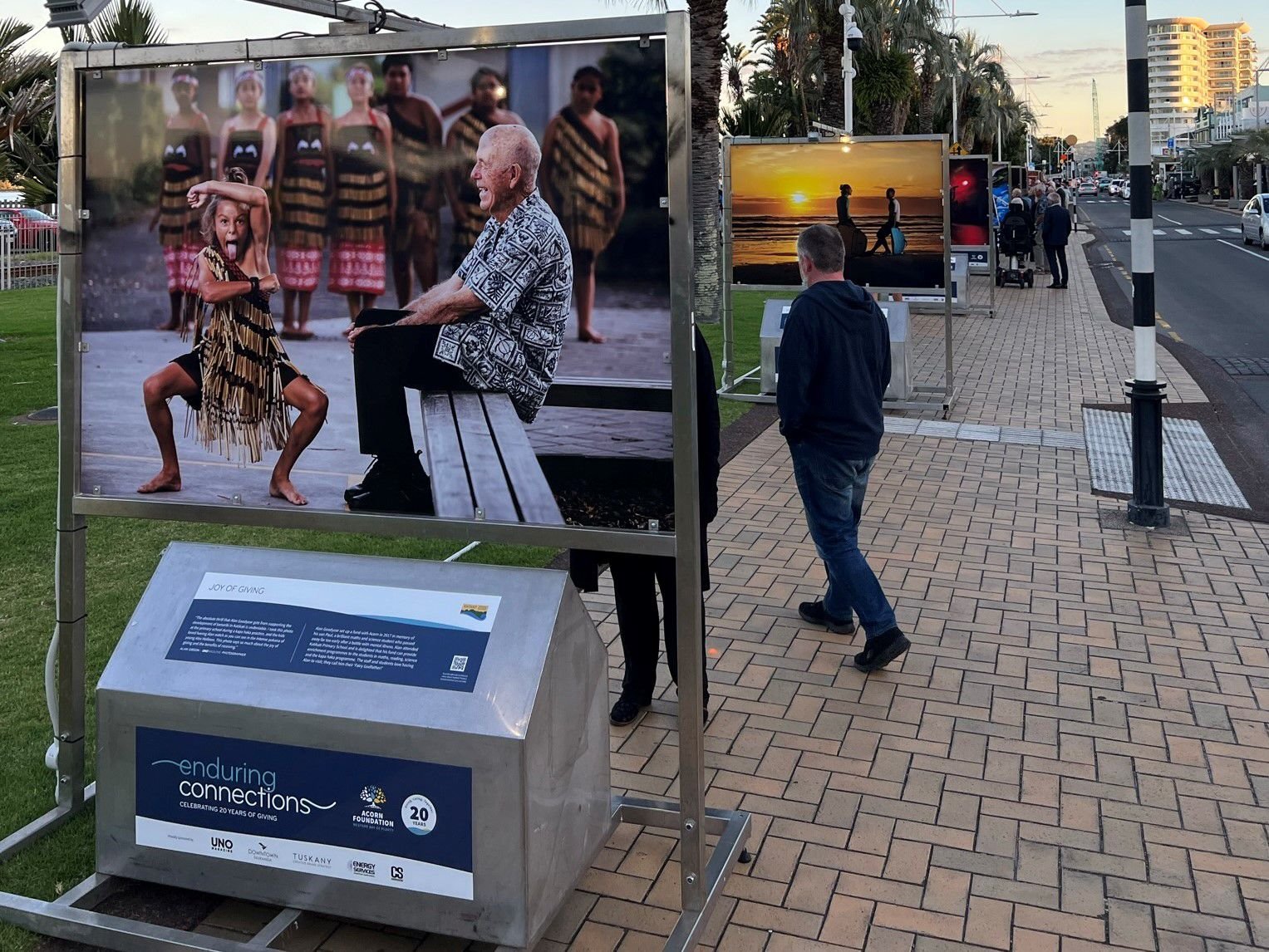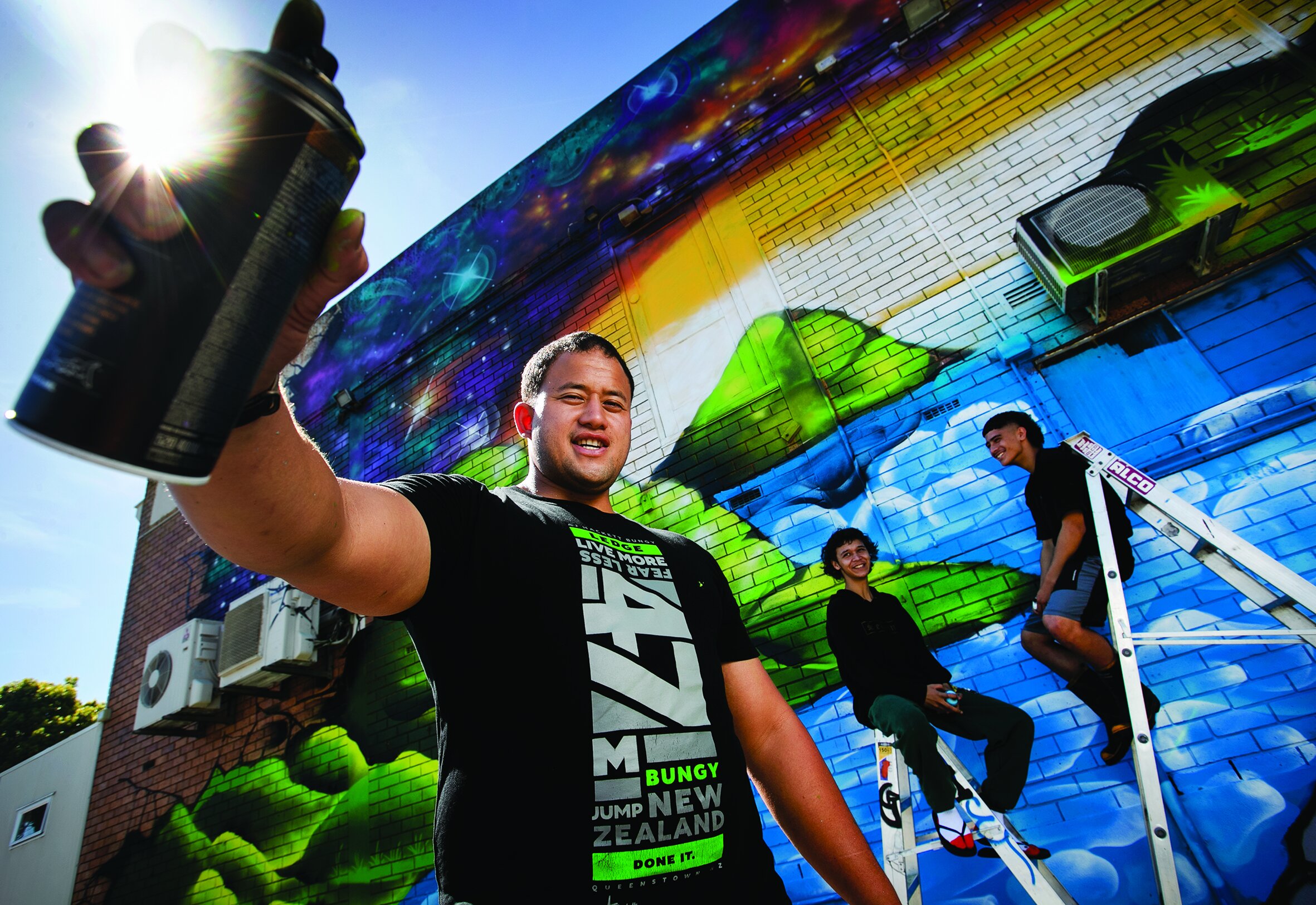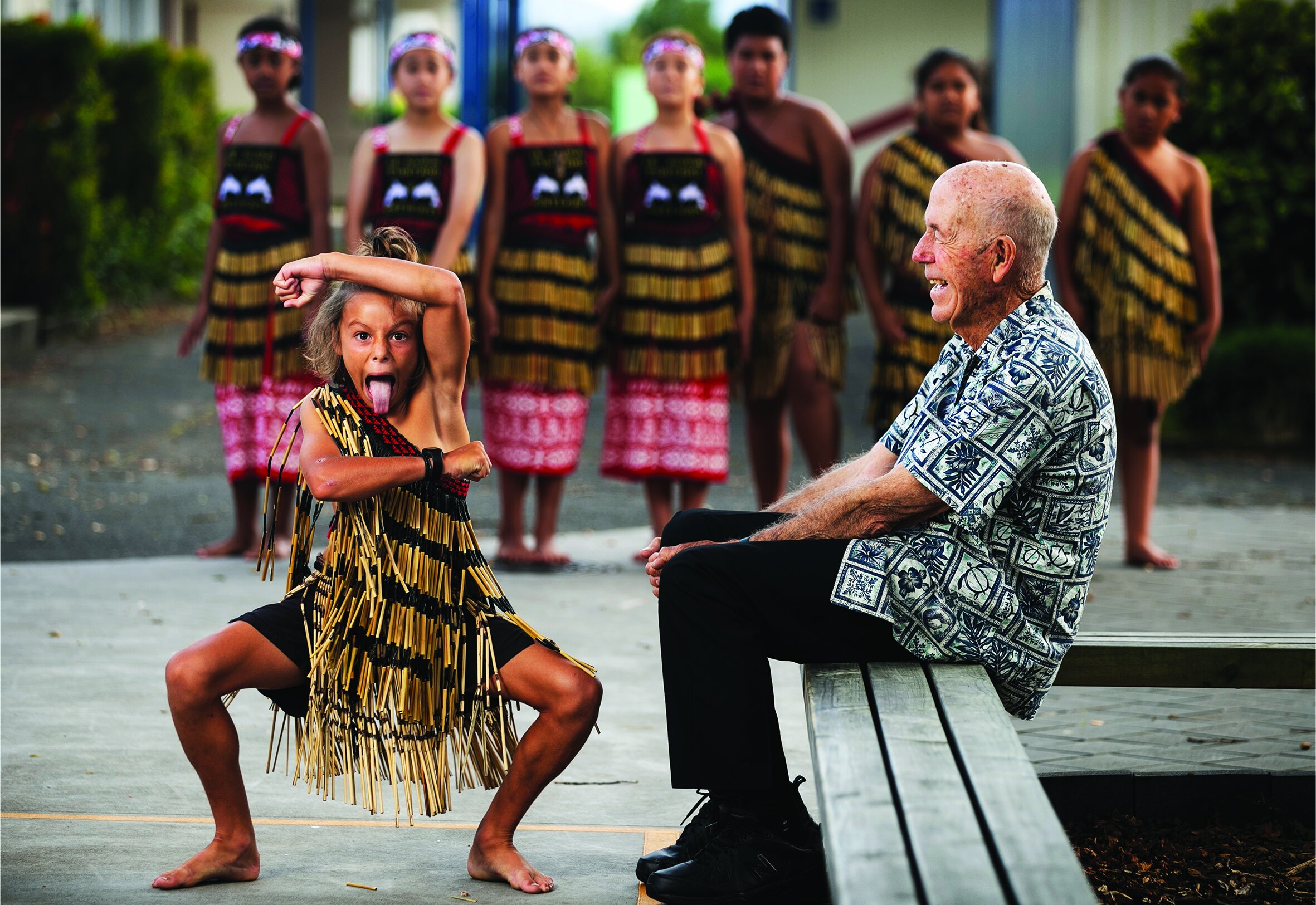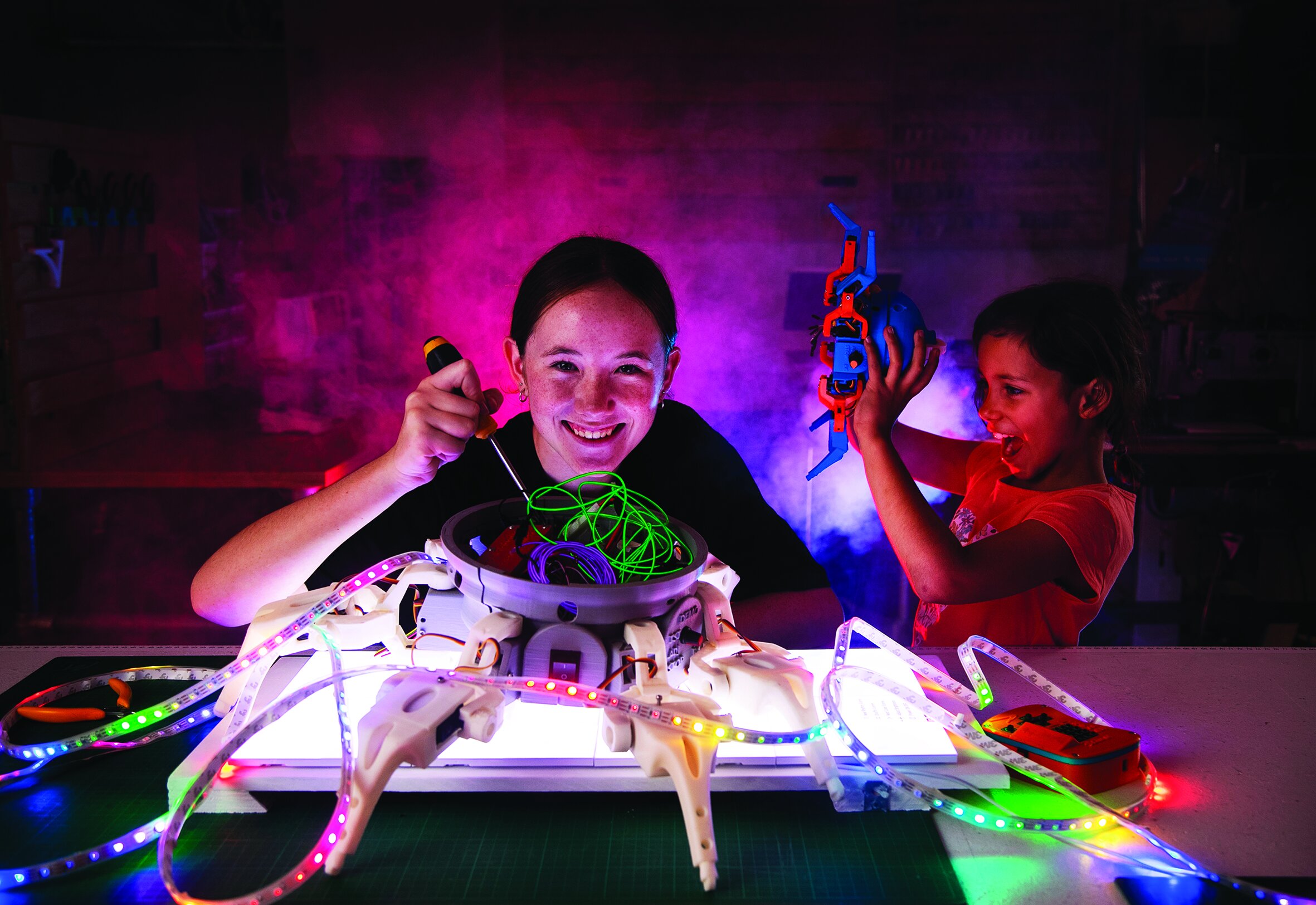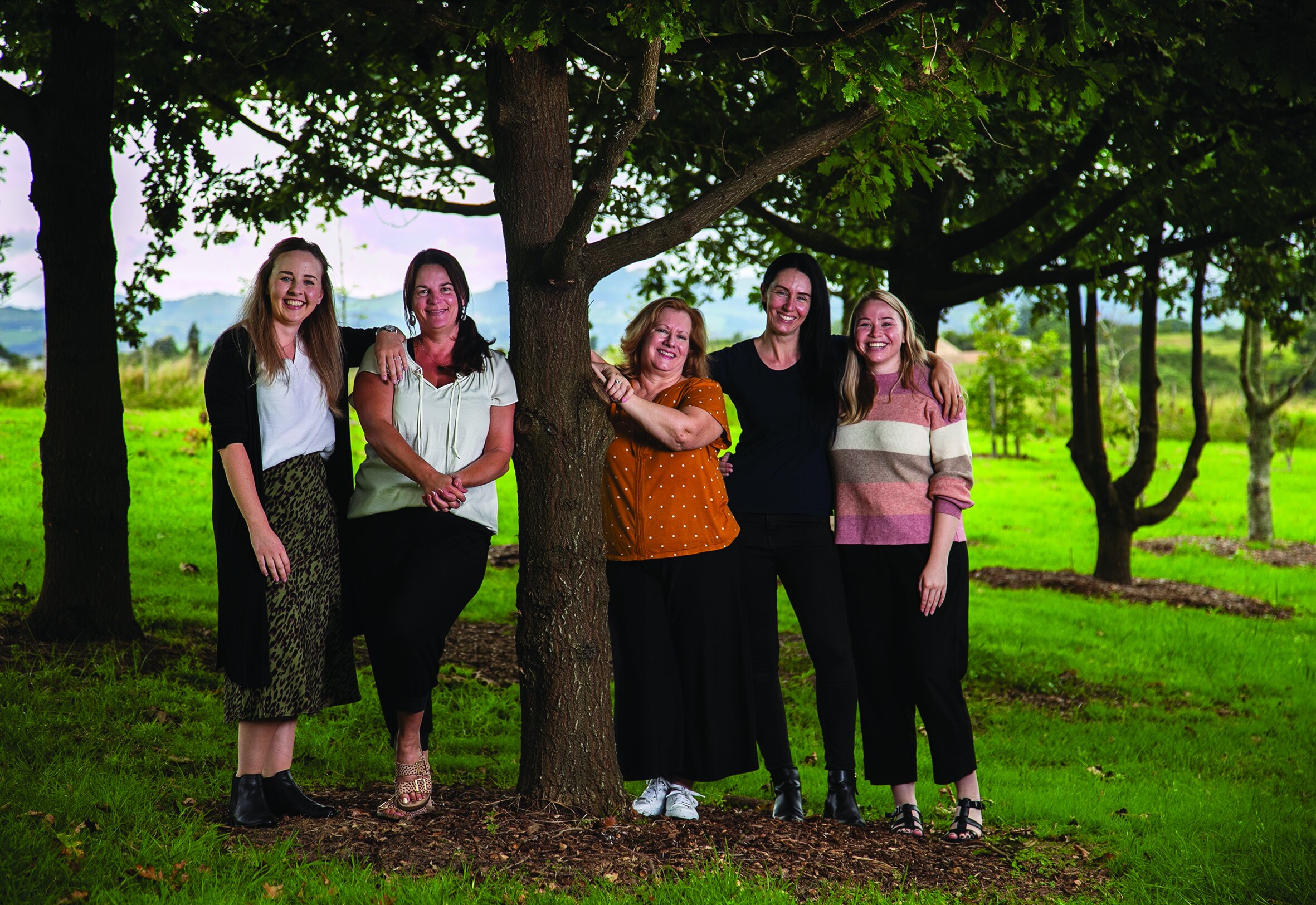Through the lens of giving
Colour, candour and compassion are three hallmarks of the stunning images featured in Acorn Foundation’s recent 20th birthday commemorative photographic exhibition, presented in partnership with UNO.
Colour, candour and compassion are three hallmarks of the stunning images featured in Acorn Foundation’s recent 20th birthday commemorative photographic exhibition, presented in partnership with UNO Magazine
Photos Alan Gibson
Shifting the focus to those deserving of support has always been at the forefront of Acorn Foundation’s mahi. Their recent 20th birthday celebration was true to form, showcasing the extraordinary generosity of Acorn’s donors and the lasting impact of their gifts on the local community. In partnership with UNO and our award-winning photographer, Alan Gibson, a stunning photographic exhibition was unveiled in the heart of Tauranga on April 4.
The exhibition, Enduring Connections, featured 18 of the more than 290 charitable groups in the Western Bay of Plenty who have received funding from Acorn. Spanning organisations focussed on the arts, environment, youth, food insecurity, homelessness, health, diversity and more, these images acknowledge in a visually impactful way the enduring difference Acorn donors seek to make, and the enduring support Acorn is then able to extend to the region.
The Acorn Foundation was established back in 2003 by their inaugural chair, Bill Holland, with the support of a group of committed trustees. Acorn is now one of 17 community foundations in New Zealand that use a smarter giving model that involves pooling and collectively investing donors’ funds. The capital in the fund remains intact, while a portion of the income is distributed annually to the local community. Using this method means that Acorn’s donors can support causes close to their hearts, forever.
The Edna Brown Fund was Acorn’s first donation. Upon Edna’s death in 2001, she left $67,000 for the benefit of the community. When Acorn was founded two years later, her trustees thought that the foundation would be the perfect place for Edna’s gift. After 20 years, Acorn has given away more than $89,000 from Edna’s fund to support local charitable organisations. Her fund value is now $91,000, and is a perfect example of the community foundation model. The Acorn team know that Edna would be absolutely thrilled.
In 2023, over 430 donor funds – and more than 600 donors overall – support the community in all sorts of ways. Thanks to these generous donors, Acorn has now reached $60 million in funds under management that are invested with Craigs Investment Partners. More than $13 million overall has been distributed to nearly 300 worthy causes in the Western Bay of Plenty and other areas important to Acorn’s donors.
The Acorn team has a tremendous belief in the power of community foundations and the enduring difference that Acorn can make in this region. Understanding that overseas community foundations are over 100 years old, they know that Acorn’s story is just beginning.
SURFING UP SUCCESS
“The new day dawning is really a metaphor for the work done by the amazing crew at Live for More. It’s a new beginning, or a fresh start from their troubled pasts, through the surf therapy programmes they run. I think that this image captures the ray of hope that their work brings to so many, one wave at a time.”
~ ALAN GIBSON - PHOTOGRAPHER
Live for More empowers vulnerable young men who are caught up in lifestyles that include alcohol, drugs and crime to find freedom from their troubled pasts and be inspired to live positive and fulfilling lives. Acorn Foundation funding supports Live for More to provide counselling and mentoring for these rangatahi, giving them a renewed understanding of their identity, purpose and potential.
COLOUR ME HAPPY
“Tasked with creating a mural covering the drab wall of a Te Puke commercial building, artist Kalib Wallace was struggling with both deadlines and bad weather. Luckily, rangatahi from Ngā Kākano Foundation were there to help him create something beautiful while learning invaluable skills from an accomplished artist.” ~ ALAN GIBSON - PHOTOGRAPHER
Ngā Kākano Foundation provides a wide range of free and accessible health and social services to families living in Te Puke. Acorn has a strong focus on youth development through field of interest funds, which supported young people to create this colourful mural as a creative outlet.
STREAMS OF CHANGE
“When a photographer asks you to stand in the middle of a fast-flowing stream, some people might think twice. Karen Smillie jumped - or, rather, fell! - straight in, keen to promote the work Project Parore do to protect the water quality in Bay of Plenty catchment. Fellow passionate environmentalist Ben Haarmann joined her on the bank.” ~ ALAN GIBSON - PHOTOGRAPHER
Project Parore focuses on improved freshwater quality through restored native habitats. Volunteers work with local landowners to practice ecological restoration for improved soil health, stream health and biodiversity in the waterways that feed into Northern Tauranga Harbour.
HISTORY COMES ALIVE
“Hidden away among the majestic trees that are its namesake, The Elms | Te Papa has been a place for locals to gather and learn for generations. Through the lens, I can see paintings, photographs, and beautifully crafted objects. The smell of ancient woods used to make them combine with the sights to transport visitors back in time.”
~ ALAN GIBSON - PHOTOGRAPHER
The Elms | Te Papa Tauranga is a very important heritage and educational site as a place of early contact between Māori and Pākehā. Acorn’s unrestricted fund has provided support for expenses, and in addition, Trustees have set up a Community Group Fund with Acorn to ensure that this site remains open for future generations.
EMBRACING COMMUNITY SPIRIT
“The Holi Festival has its roots in Hindu traditions and is an opportunity for the local Indian community to bring a sense of fun and the colours of their culture to Tauranga. I wanted to capture the emotions expressed as people unleash their inner child, tossing coloured powder that all bear different meanings.” ~ ALAN GIBSON - PHOTOGRAPHER
Acorn’s VitalSigns® research highlights the importance of residents feeling a sense of belonging and engagement in their town and of migrants feeling welcomed by locals. This desire to enhance community connectedness is why Acorn is a joint funder of the Tauranga Western Bay Community Event Fund.
JOY OF GIVING
“The absolute thrill that Alan Goodyear gets from supporting the development of tamariki in Katikati is undeniable. At the primary school during a kapa haka practice, the kids loved having Alan watch, as you can see in the intense pukana of young Alex Hollows.” ~ ALAN GIBSON - PHOTOGRAPHER
Alan Goodyear set up a fund with Acorn in 2017 in memory of his son Paul, a brilliant maths and science student who passed away far too early after a battle with mental illness. Alan attended Katikati Primary School and is delighted that his fund can provide enrichment programmes to the students in maths, reading, science and kapa haka.
MUSIC FOR THE SOUL
“Standing in the darkened theatre as the chords of Pachelbel’s Canon ring out through the smoky haze has to be one of the most beautiful moments in this project. The three members of the Opus Orchestra made their way through an extra-long version of the musical masterpiece while I crafted my image. It was a stunning experience!” - ALAN GIBSON - PHOTOGRAPHER
Opus Orchestra was founded in 1991 to positively impact the cultural life in the BOP/Waikato regions. The orchestra provides performance opportunities for professional musicians with local audiences. The trustees of Opus Orchestra recently opened a Community Group Fund with the Acorn Foundation to help fund the Opus Pathways programme to support the development of musicians at all stages of their careers.
ENGAGING AT SPEED
“Youth Encounter Ministries Trust uses the love of action to engage young people at their Paengaroa property. The thrill of riding dirt bikes through the mud together is as important as the camaraderie and mentorship the team provide for our youth who feel lost.” ~ ALAN GIBSON - PHOTOGRAPHER
Youth Encounter Ministries Trust unleashes potential in young people by encouraging a sense of belonging and belief in their value, giving them hope they can become who they are meant to be. Acorn funding supports operational expenses for youth development interventions that empower vulnerable young people “to live a life wide open”.
IMAGINATION AT PLAY
“People say you should never work with children or animals. However, I had so much fun capturing this image of enthusiastic participants at STEM Wana Trust, which is found at Basestation on Durham Street. These budding scientists, technologists, engineers and mathematicians are learning that the world is there for the making.” ~ ALAN GIBSON - PHOTOGRAPHER
Many Acorn donors like to support organisations which promote learning opportunities for children from all backgrounds. STEM Wana Trust’s mission is to engage and inspire a new generation in Science, Technology, Engineering and Mathematics (STEM) activities and opportunities.
BIRD’S EYE VIEW
“The guardians of our beaches do the most extraordinary work, so I wanted to capture this image using drone technology to achieve a perspective most people don’t get to see. While standing on the beach, I took this photo of the Waihi Beach lifeguard crew going through a practice rescue beyond the breakers so that they are ready to help when it matters most.”
~ ALAN GIBSON - PHOTOGRAPHER
The volunteers at Waihi Beach Lifeguard Services patrol the 10km long peninsula and provide search and rescue services around the 75km coastline. Acorn is proud to support this important mahi, as well as Mount Maunganui Lifeguard Service, Omanu Beach Surf Life Saving
Club, Papamoa Surf Life Saving Club, and Pukehina Surf Rescue.
RESCUING THE VULNERABLE
“The love and dedication of the team at the ARRC Wildlife Trust was immediately evident to me in the way they handled the morepork chick we photographed. A pair of steady but delicate hands cradled the tiny bird while vet Liza Schneider checked it over and gave the volunteers a glowing report of the bird’s improvement.” ~ ALAN GIBSON - PHOTOGRAPHER
The team at Animal Rescue & Rehabilitation Centre (ARRC) Trust are passionate about caring for wildlife which has been injured or orphaned in the Bay of Plenty. ARRC has a Community Group Fund with Acorn and also receives tagged funding each year from the J Abbot Fund.
KO TĀKU TOI TĀKU OHOOHO! MY ORIGIN IS MY AWAKENING!
“Art was all around us at Te Tuhi Mareikura’s hub in Mount Maunganui. Paintings and drawings hung on the walls, while around the table, discussions were underway about the carving of a taiaha. It is a place where young people can let the art get under their skin, and their creativity knows no bounds.” ~ ALAN GIBSON - PHOTOGRAPHER
Te Tuhi Mareikura Charitable Trust (TMT) is passionately dedicated to the vision of building a strong Māori collective identity for those from the Tauranga Moana region through an expression of Māori culture and arts. Acorn is a new funder supporting their youth programme, Toi Ohooho.
PROTECTING OUR FOREST
“The beautiful North Island brown kiwi calls Ōtanewainuku Forest home. Ross Edwards checked one of the many pest traps in the forest and had caught a ferret. Ross, and dozens of other volunteers like him, happily give up their time to check and bait traps, clear tracks and generally cherish our environment. I see an immense pride and passion in Ross’s face for the work they do for our beloved kiwi and the native forest.” ~ ALAN GIBSON - PHOTOGRAPHER
Volunteers at Ōtanewainuku Kiwi Trust work with DOC to protect kiwi, kōkako, and the conservation of the forest through pest control, kiwi and kōkako translocation, kiwi chick rearing, education and fundraising. The trust has established a Community Group Fund with Acorn and also receives tagged funding from the J Abbot and M&L Bellerby funds.
BOXING UP COMPASSION
“Tauranga Community Foodbank warehouse manager and buyer, Jordy Gastmeier, is pictured among the jungle of boxes and supplies which illustrate the level of need in our community. Signs like ‘Strictly for clients living in cars’ say it all. With this photo, I wanted to capture the enormity of their vital work.”
~ ALAN GIBSON - PHOTOGRAPHER
Demand is so high that, in the last year, Tauranga Community Foodbank gave out 6,900 food parcels, helping over 18,500 people. In 2022, Acorn support from trusts, corporates, and their unrestricted fund contributed to food distributed by the Foodbank which was used to prepare nearly 200,000 meals.
COLOURS OF THE RAINBOW
“Here I strove to capture the pride and aspirations of the Gender Dynamix team in their villa at Historic Village. The staff have created a space here where people can be at peace and free from judgement. The wall is covered in pieces of art that clients have created to reveal their stories, feelings and hopes.” ~ ALAN GIBSON - PHOTOGRAPHER
As a long-time local donation manager for The Tindall Foundation, Acorn funds local organisations on their behalf that promote an inclusive, diverse and welcoming community. Gender Dynamix works to meet the mental health needs of the BOP's transgender and non-binary community.
HEALING WATERS
“Roger Clark is well aware that sailing has long been seen as a rich man’s sport, but he is determined to change that impression. Showing kids who’ve never sailed before the pleasure of spending time on the water has become a mission.” ~ ALAN GIBSON - PHOTOGRAPHER
Thanks to the Sail for Life Community Group Fund set up at Acorn, the BOP Sailing Academy Trust has been able to share the love of sailing with locals, irrespective of means or ability. Sailing is a demanding sport that brings out fantastic qualities in young people, such as tenacity, self-reliance and discipline. The challenge and sense of achievement on offer are so empowering.
CARE AND COMPASSION
“To sit with Brian and Shirley and hear the stories about the help they have received at home from staff at Waipuna Hospice was uplifting. This is a happy image; perhaps it will help dispel some of the sad connotations people associate with the term ‘hospice’.” ~ ALAN GIBSON - PHOTOGRAPHER
The work of Waipuna Hospice is celebrated by Acorn’s donors, as it is their most-named charity in wills. Waipuna receives more than $115,000 from Acorn each year, coming from 11 estates and living givers. In the future, dozens of Acorn funds will provide hundreds of thousands of dollars each year to provide care both for patients and families.
IMPROVING A HOME
“Mike has a plastic container in the corner of his home that holds three months’ worth of water from a leak in his roof. It’s a big container. Mike was delighted to have the friendly team from Sustainability Options arrive at this Bethlehem home to discuss plans to fix leaks and install insulation. Although the house is small, the improvements that the organisation is going to make will transform it into a true home for a deserving gentleman.” ~ ALAN GIBSON - PHOTOGRAPHER
Sustainability Options is a social business which provides free home assessments to ensure that local families are living in safe, warm and dry
homes. The Acorn Foundation provides funding that assists Sustainability Options to perform home repairs, provide heaters, blankets and curtains, and improve healthy housing literacy across the Bay of Plenty.
A PLACE TO REMEMBER
Acorn’s staff is small but mighty. Here, five of our seven team members are pictured at the Acorn Foundation Oak Grove in Cambridge Park, where trees are planted in memory of Acorn donors who have passed away. We are so lucky that the foundation has always been supported by fantastic volunteers. Nine Trustees provide governance and oversight and sit on one of the four foundation committees: Distributions; Investment Advisory; Scholarship; and Audit, Risk and Policies. Additional community members help make distribution decisions and review scholarship applications, while investment professionals share their expertise to oversee the work done by our long-time fund manager, Craigs Investment Partners.
Meet the photographer ALAN GIBSON
Alan’s love of photography came from his father who shocked his own father when he announced he was going to be a photographer instead of running the family farm. Eventually, with a young family in tow, he did return to the farm and continued to document the unique culture that surrounds us in this country. “He taught me to see the beauty in the backlit dust cloud kicked up by a mob of sheep being mustered or the stunning contrast of muted light coming through a woolshed door.” Alan worked as a photojournalist for The New Zealand Herald for over 20 years, as well as for agencies in the UK, servicing all the big papers of Fleet Street. He now uses those story-telling skills for a wide range of commercial clients.
Funding from the Acorn Foundation simply wouldn’t exist without the generosity of our supporters. Each of the deceased donors in this collage had their own hopes and desires for the region, with some naming specific charities and others selecting a field of interest for their Acorn fund. Another group of donors entrust their annual distributions to the dedicated volunteers on the Acorn Distributions Committee who evaluate applications for the unrestricted funds. Support for the community is not just for the wealthy; most Acorn donors are very modest people who are passionate about this region. However, our supporters all share the same desire to give back to this community and a strong belief in the long-term power of Acorn’s smarter giving model.
Home remedy
Photographer Alan Gibson’s new book For The Love Of The Country highlights the everyday beauty in the work of New Zealand’s farming families.
Photographer Alan Gibson’s new book For The Love Of The Country highlights the everyday beauty in the work of New Zealand’s farming families. Here’s an extract on Tauranga’s The Good Farm, a family
of organic farmers supplying the Bay with “good medicine”.
Loren Gibbs and partner Michaela Good own The Good Farm in Welcome Bay, Tauranga, and run it on organic principles, selling the milk, veggies and eggs they produce to locals. Loren Gibbs explains: “My mum always said that food is medicine. So, if you are eating good food, you are getting good medicine.
“At The Good Farm, we are on 10 hectares, and we are running mainly a raw-milk dairy herd. We milk between 14 and 16 cows during the day. We are not certified organic, but we like to think that we work alongside the principles of organic agriculture and gardening. We are spray free on our pastures and our vegetable garden. We don’t use synthetic fertilisers, any chemical pesticides or herbicides.
“We have a farm shop and that’s where we make most of our income. All the milk from our cows gets sold on the farm through a self-service dispenser. That’s about 180 litres a day. All the produce from the veggie garden and our eggs get sold through the shop as well, on an honesty system that works well. We get hundreds of people through the shop every week and they come from all walks of life; they are not all a bunch of hippies. The only thing they have in common is that they all want fresh, raw milk and that they care about their food. That’s the main thing.”
Purchase
For The Love of The Country
at all good bookstores.


